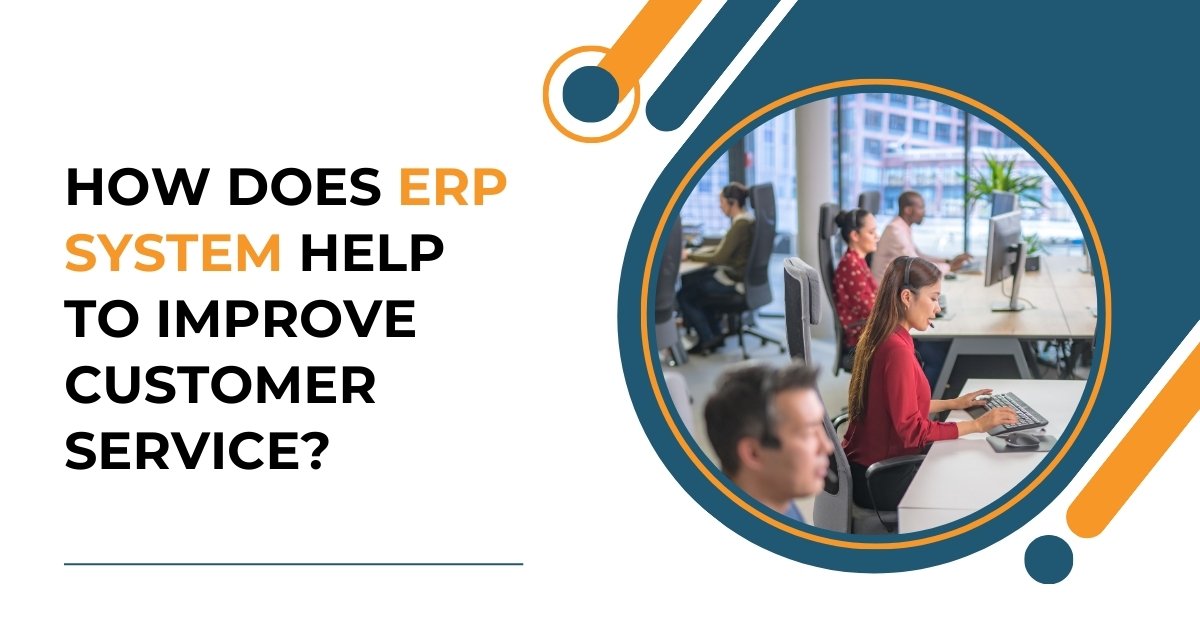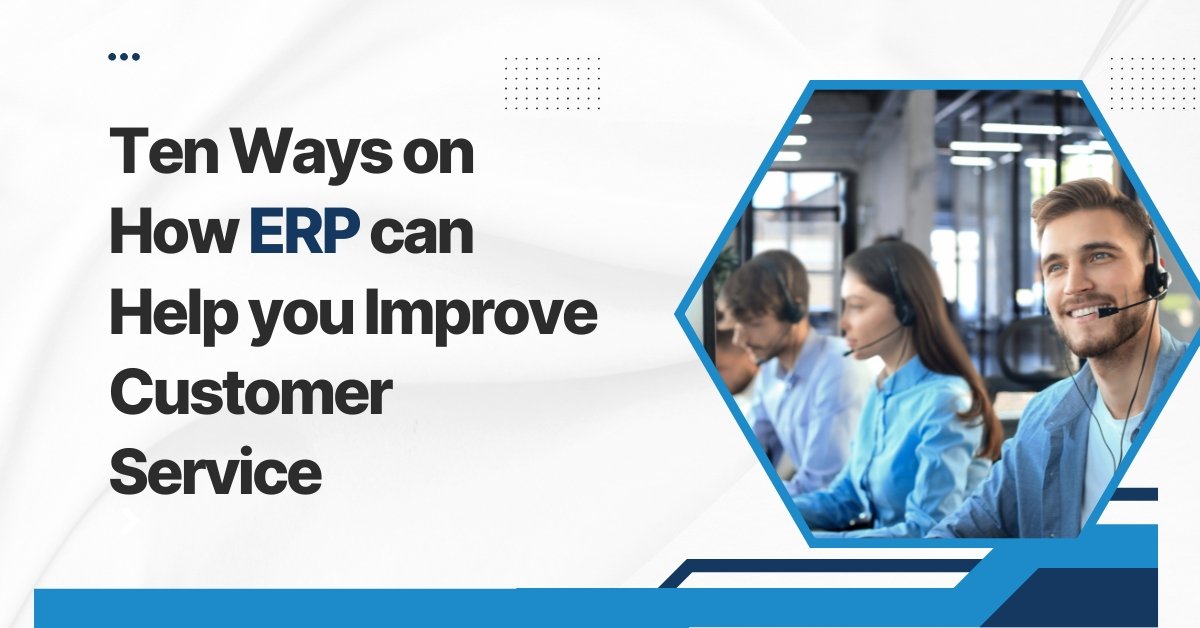An ERP (Enterprise Resource Planning) system is an integrated software solution that consolidates various business processes to enable seamless data flow and improved operational efficiency. The role of customer service in maintaining a company’s reputation and ensuring customer retention is crucial. Leveraging an ERP system enhances the ability of businesses to meet customer needs by providing better coordination, automation, and insights. This article explores the ways an ERP system improves customer service and supports long-term business growth.
How ERP Systems Address Customer Service Challenges?
ERP systems are powerful tools that help businesses solve common challenges in customer service. One of the main benefits of an ERP system is that it brings all customer data into one centralized place, so service teams can access information quickly and easily. This means when a customer calls or emails, the service team can pull up their order history, past interactions, and other relevant details right away, making it easier to respond quickly and accurately.
Another way ERP systems help is by improving communication and coordination across different departments, like sales, support, and logistics. This is crucial when solving customer issues that involve multiple areas of the business, such as order fulfillment or product returns.
Here are 10 effective ways an ERP System can Improve Customer service:
1. Centralized Data Management
One of the big advantages of an ERP system is that it keeps all customer information in one place. Whether it’s order history, preferences, or past support conversations, everything is stored in a single database. This means that service teams can quickly access accurate information when customers reach out. With this easy access, teams can respond faster and more effectively, leading to quicker solutions and happier customers.
2. Enhanced Operational Efficiency
An ERP system helps streamline business operations by automating routine tasks and providing real-time updates across departments. This boosts efficiency and minimizes the chances of errors or delays in serving customers. For customer service teams, this means more time to focus on helping customers and solving problems. The result? Better service quality and improved customer satisfaction.
3. Streamlining the Backend Processes
ERP systems play a key role in making backend operations more efficient and smooth. Essential tasks like order processing, billing, inventory management, and logistics can be complex and time-consuming without the right tools. An ERP system automates these processes, ensuring that everything runs more smoothly and quickly. For example, when a customer places an order, the system automatically updates inventory levels, checks stock availability, and triggers the order fulfillment process.
4. Enhanced Communication and Collaboration
ERP systems improve communication and teamwork across different departments. Customer service teams can work closely with sales, marketing, and logistics to solve customer issues quickly and effectively. Odoo CRM not only saves time but also boosts your sales team’s productivity, helping them convert more leads into loyal customers.
5. Improved Customer Insights
With the help of an ERP system, businesses can get a deeper understanding of customer behavior through data analysis. This lets them see what customers want, their preferences, and buying habits, helping companies make better decisions. By using this information, businesses can predict what customers need, craft personalized marketing campaigns, and offer tailored services that improve the overall experience.
6. Balancing Between Supply and Demand
An ERP system helps manage inventory and supply chains by providing real-time updates on stock levels and production schedules. This ensures businesses have just the right amount of products to meet customer demand without overstocking or running out. By keeping inventory at the right levels, companies can avoid delays and provide reliable, on-time service to customers.
7. Personalization and Tailored Customer Experiences
Customers love personalized experiences, and ERP systems make it easier to deliver them. By analyzing customer data, businesses can offer tailored product recommendations, special discounts, and customized communication. This personal touch makes customers feel valued and understood, encouraging them to return and do business again.
8. Efficient Inventory Management
An Automotive ERP system significantly transforms inventory management by providing real-time tracking and automation tools. In the automotive industry, managing spare parts, vehicle components, and finished goods can be complex. However, an ERP system ensures that inventory levels are always updated in real-time, reducing the chances of stockouts or overstocking. The system automates the entire inventory process, from ordering new stock to replenishing items automatically based on sales trends.
9. Integration with CRM for Superior Service
Integrating an ERP system with Customer Relationship Management (CRM) software creates a powerful tool that significantly enhances customer service. The ERP system handles the operational side, such as inventory, order processing, and financial transactions, while the CRM focuses on managing customer relationships, including sales history, preferences, and interactions. When these two systems work together, they create a unified view of each customer, allowing service teams to access all relevant information in one place.If your company wants to stay ahead, having a CRM Software is essential to create better customer experiences and drive long-term success.
10. Building Long-Term Customer Relationships
An ERP system helps companies maintain strong connections with their customers even after a purchase is made. Through features like automated follow-ups, loyalty programs, and targeted communication, businesses can stay engaged with their customers over time. By using the data collected in the ERP system, companies can tailor these interactions to the individual customer, keeping them informed about new products, offers, or updates that might interest them.
Steps to Implement Successful Customer Service
1. Understand Your Customers’ Needs
The first step in creating successful customer service is understanding your customers’ expectations and preferences. Conduct surveys, gather feedback, and use analytics to identify common pain points and areas for improvement.
2. Train and Empower Your Team
Ensure your customer service team is well-trained and equipped with the knowledge and tools they need to succeed. Training should focus on product knowledge, effective communication, and problem-solving skills.
3. Implement the Right Technology
Using technology such as ERP and CRM systems can significantly improve the efficiency and effectiveness of your customer service. These tools help centralize customer information, streamline processes, and automate routine tasks.
4. Maintain Clear Communication Channels
Offer multiple communication channels such as phone, email, live chat, and social media, and ensure they are integrated and managed cohesively. Customers should be able to reach out using their preferred method and receive consistent service across all platforms.
5. Measure and Improve Service Quality
Continuously monitor key performance indicators (KPIs) such as response time, customer satisfaction scores, and resolution rates. Regularly review these metrics to identify trends and areas where improvements can be made.
Elevating Your Customer Service with the Power of ERP
Implementing an ERP system is essential for any business that wants to improve its customer service. By providing quick access to accurate, centralized data, automating processes, and fostering collaboration between departments, ERP systems help businesses solve customer issues efficiently. With better insights into customer behavior, companies can deliver personalized experiences and build strong, lasting relationships.
If you’re looking to improve your business operations with an experienced Odoo ERP development Company in India offered a tailored solutions to your needs. Partnering with the right Odoo experts ensures that your ERP solution is not only implemented effectively but is also scalable to support future growth.





